Phillis Wheatley and Anne Bradstreet, two remarkable women from vastly different backgrounds, emerged as literary pioneers in the annals of American history. Their writings, shaped by their unique experiences and the prevailing social and cultural landscapes, left an indelible mark on the nation’s literary heritage.
As we delve into their lives and works, we will explore the literary themes they explored, the styles they employed, and the ways in which they expressed their female identities through their writing. Their contributions to the development of American literature will be examined, shedding light on their profound impact on subsequent generations of writers.
Early Lives and Influences
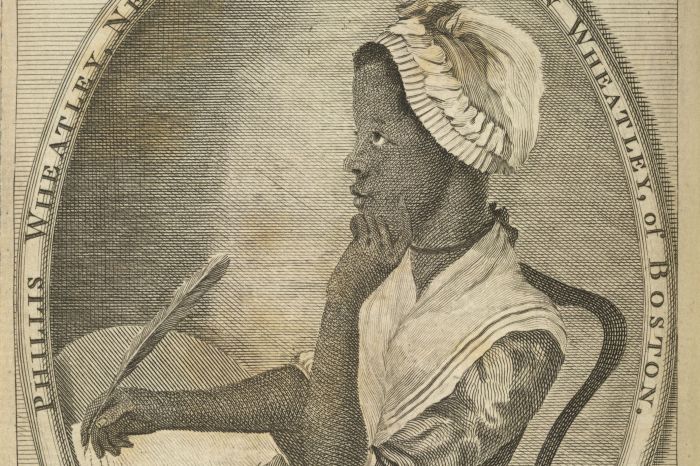
Phillis Wheatley and Anne Bradstreet, two pioneering figures in American literature, emerged from vastly different backgrounds yet shared a common passion for writing and a profound influence on the literary landscape of their respective eras.
Phillis Wheatley
Born in West Africa around 1753, Phillis Wheatley was enslaved and brought to America at a young age. Despite the hardships she endured, she displayed an extraordinary talent for language and literature, learning to read and write in English within a short period.
Wheatley’s early life in Africa exposed her to a rich oral tradition of storytelling and poetry, which likely influenced her literary development. Moreover, her experiences as an enslaved person in America shaped her perspective on themes of freedom, oppression, and the search for identity.
Anne Bradstreet, Phillis wheatley and anne bradstreet
Anne Bradstreet was born in England in 1612 into a Puritan family. She immigrated to America with her family in 1630, where she lived in the Massachusetts Bay Colony. Unlike Wheatley, Bradstreet enjoyed a relatively comfortable upbringing and received a formal education.
The Puritan culture of her time emphasized literacy and intellectual pursuits, which fostered Bradstreet’s passion for writing. Her experiences as a colonist in the New World provided her with unique insights into the challenges and opportunities of life in a frontier society.
Literary Themes and Styles
Phillis Wheatley and Anne Bradstreet, two prominent poets of the 17th and 18th centuries, explored a range of literary themes and employed distinct poetic styles that reflected their unique experiences and perspectives.
Major Literary Themes
Both Wheatley and Bradstreet explored themes of religion, nature, and personal experience in their poetry. Wheatley’s work often focused on her experiences as an enslaved African American woman, while Bradstreet’s poetry reflected her Puritan faith and domestic life.
Poetic Styles
Wheatley’s poetry is characterized by its formal structure, use of classical allusions, and vivid imagery. Her work often employed heroic couplets and iambic pentameter, giving her poems a sense of grandeur and eloquence. Bradstreet’s poetry, on the other hand, is more personal and introspective, with a focus on everyday experiences and emotions.
Her poems often use simple language and free verse, reflecting her desire to express her inner thoughts and feelings.
Female Identity and Expression
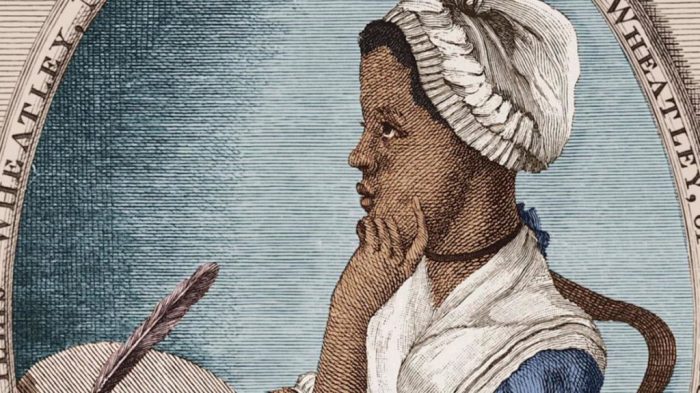
Phillis Wheatley and Anne Bradstreet, as female poets in their respective eras, utilized their writing as a means to express their identities and perspectives as women. Their experiences as women greatly influenced their literary voices and the themes they explored in their poetry.
Phillis Wheatley
Wheatley’s experiences as an enslaved African woman shaped her unique perspective and the expression of her female identity. Through her poetry, she challenged societal norms and the prevailing views of race and gender. She celebrated her African heritage while also navigating the complexities of her position as a woman in a patriarchal society.
Anne Bradstreet, Phillis wheatley and anne bradstreet
Bradstreet’s Puritan upbringing and the limitations placed on women during her time influenced her literary voice. Her poetry often explored the challenges and joys of being a woman in a society that restricted their roles. She celebrated domesticity and motherhood while also expressing her intellectual and spiritual aspirations.
Impact on American Literature
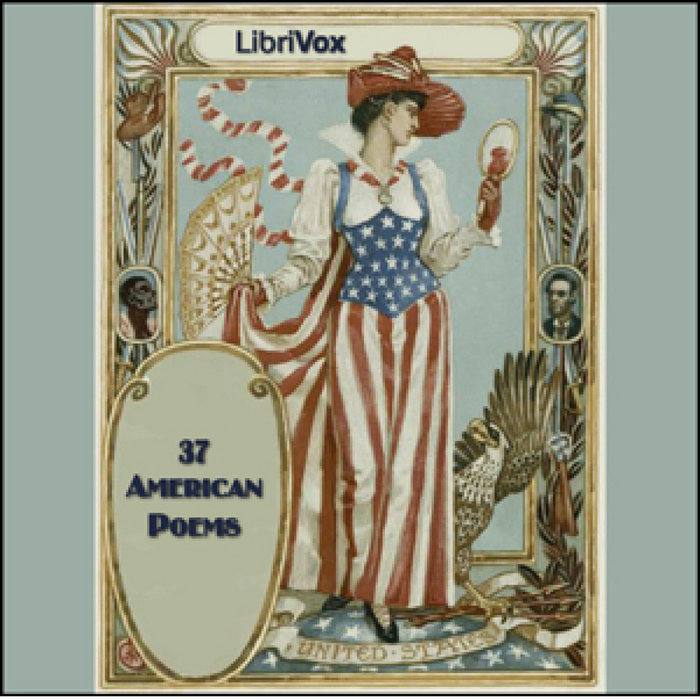
Wheatley and Bradstreet played pivotal roles in the genesis of American literature. Their groundbreaking contributions laid the groundwork for future generations of writers and shaped the literary landscape of the nation.
Wheatley’s Influence
- Established the Voice of the Enslaved:Wheatley’s poetry gave voice to the experiences of enslaved individuals, challenging prevailing narratives and humanizing their plight.
- Bridged Cultural Divides:Her works transcended racial and cultural boundaries, fostering empathy and understanding between different segments of society.
- Inspired Abolitionist Movements:Wheatley’s powerful verses became a rallying cry for abolitionists, contributing to the growing momentum for social change.
Bradstreet’s Influence
- Pioneered American Poetry:Bradstreet’s poems were among the earliest published works of American literature, setting a precedent for subsequent poets.
- Expressed Female Perspectives:Her writings provided a rare glimpse into the experiences and emotions of women in colonial America, challenging traditional gender roles.
- Influenced Puritan Literature:Bradstreet’s works reflected the religious and cultural values of her Puritan community, shaping the development of American Puritan literature.
Historical and Cultural Context
Phillis Wheatley and Anne Bradstreet were two remarkable poets who lived and wrote during distinct historical and cultural periods. Wheatley’s life was marked by the horrors of slavery, while Bradstreet’s was shaped by the strictures of Puritanism. Both women’s work was influenced by the Enlightenment, a movement that emphasized reason and individual rights.
Slavery
Wheatley was born in Africa and sold into slavery at a young age. She was brought to Boston in 1761 and purchased by the Wheatley family, who recognized her intelligence and provided her with an education. Despite her enslavement, Wheatley’s writing reflects a deep understanding of the Enlightenment’s ideals of freedom and equality.
Puritanism
Bradstreet was born into a Puritan family in England. Puritans were a religious group who believed in the importance of personal piety and strict moral conduct. Bradstreet’s writing often reflects her Puritan beliefs, exploring themes of sin, redemption, and the importance of faith.
Enlightenment
The Enlightenment was a philosophical movement that emerged in Europe in the 17th and 18th centuries. It emphasized the importance of reason, individualism, and the scientific method. Both Wheatley and Bradstreet were influenced by Enlightenment ideas, which can be seen in their focus on individual experience and their use of reason to explore complex themes.
Comparative Table
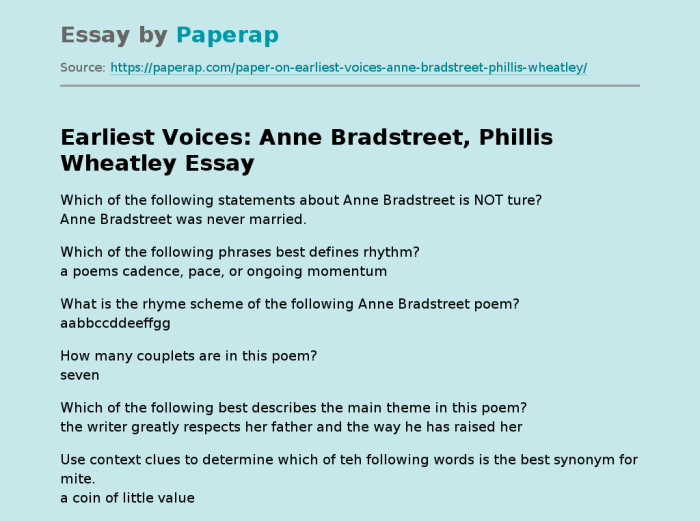
Phillis Wheatley and Anne Bradstreet, two prominent figures in early American literature, shared the distinction of being among the first published female poets in the colonies. Despite their shared gender and literary pursuits, their lives, works, and literary significance exhibit notable differences.
This table presents a comparative analysis of key aspects of their lives, works, and literary significance, highlighting the similarities and contrasts that shaped their respective literary journeys and contributions to American literature.
Early Life
- Phillis Wheatley: Born in West Africa around 1753, enslaved and brought to Boston in 1761 at the age of seven or eight.
- Anne Bradstreet: Born in Northampton, England, in 1612, emigrated to the Massachusetts Bay Colony with her family in 1630.
Literary Themes
- Phillis Wheatley: Explored themes of slavery, freedom, Christianity, and classical mythology.
- Anne Bradstreet: Explored themes of Puritanism, domesticity, nature, and mortality.
Style
- Phillis Wheatley: Wrote in a highly formal and polished style, influenced by the neoclassical poets of the time.
- Anne Bradstreet: Wrote in a more personal and introspective style, often using plain language and everyday imagery.
Female Identity
- Phillis Wheatley: Explored her experiences as an enslaved African woman and used her poetry to challenge societal norms and advocate for equality.
- Anne Bradstreet: Explored the complexities of female identity within the constraints of Puritan society, often expressing her desire for intellectual and emotional fulfillment.
Impact on American Literature
- Phillis Wheatley: Her work inspired other African American writers and helped to pave the way for a more diverse and inclusive American literary landscape.
- Anne Bradstreet: Her work provided a valuable glimpse into the lives of early American women and established a precedent for female authorship in the colonies.
Timeline of Events
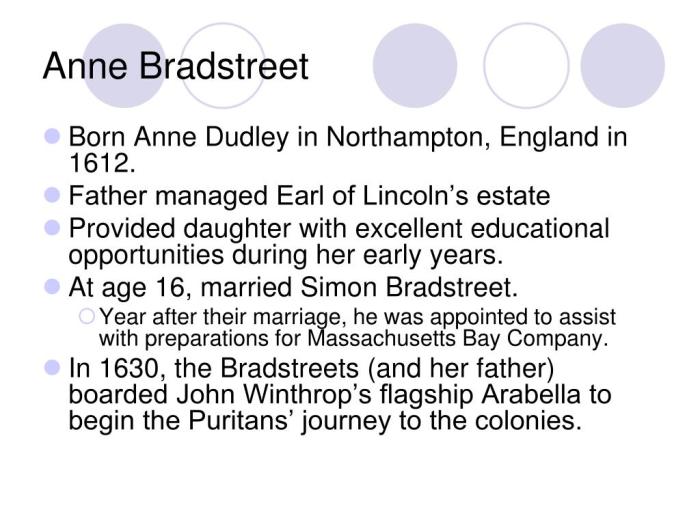
This timeline illustrates the significant events in the lives of Phillis Wheatley and Anne Bradstreet, providing a comprehensive overview of their personal and literary journeys.
Note:The timeline below is presented in chronological order and includes key dates, locations, and descriptions of major events in their lives.
Phillis Wheatley
- c. 1753:Born in West Africa (present-day Senegal or Gambia).
- 1761:Enslaved and brought to Boston, Massachusetts.
- 1767:Purchased by John Wheatley, a wealthy Boston merchant.
- 1770:Publishes her first poem, “On the Death of a Young Lady of Five Years of Age.”
- 1773:Publishes her first collection of poems, “Poems on Various Subjects, Religious and Moral.”
- 1775:Travels to England and meets prominent figures such as the Countess of Huntingdon and Benjamin Franklin.
- 1776:Returns to Boston and continues to write poetry.
- 1784:Dies in Boston at the age of 31.
Anne Bradstreet, Phillis wheatley and anne bradstreet
- 1612:Born in Northampton, England.
- 1628:Immigrates to the Massachusetts Bay Colony with her family.
- 1630:Marries Simon Bradstreet.
- 1647:Publishes her first collection of poems, “The Tenth Muse Lately Sprung Up in America.”
- 1650:Her husband becomes governor of the Massachusetts Bay Colony.
- 1666:Her home burns down, destroying many of her manuscripts.
- 1678:Dies in Andover, Massachusetts, at the age of 66.
FAQ Explained: Phillis Wheatley And Anne Bradstreet
When was Phillis Wheatley born?
Around 1753
What was Anne Bradstreet’s most famous work?
The Tenth Muse Lately Sprung Up in America
How did Phillis Wheatley’s experience as an enslaved person influence her writing?
It shaped her perspectives on freedom, equality, and the complexities of human nature.